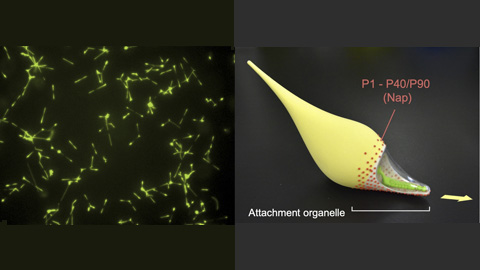A research team including the involvement of the UAB has identified the P116 protein, by which the bacterium Mycoplasma pneumoniae obtains cholesterol and other lipids needed to survive. The study, led by the IBMB-CSIC and the Buchmann Institute in Germany, has managed to decypher the structure and functioning of this protein that is so essential to the bacterium. The results have biotechnological implications and will help to develop new tools to fight against Mycoplasma infections.

Mycoplasma pneumoniae is responsible for approximately 30% of community-acquired human pneumonia and other respiratory diseases affecting all ages, but particularly children. This type of bacteria needs to extract lipids, such as cholesterol, from the host environment for survival.
Now, a new research has identified the protein with which the M. pneumoniae bacteria extracts cholesterol and other lipids needed to maintain the integrity of its membrane and ensure its survival.
The study, which included the involvement of Marina Marcos and Jaume Piñol, researchers from the UAB Department of Biochemistry and Molecular Biology, was led by researchers Ignacio Fita and Achilleas Frangakis, the former from the Institute of Molecular Biology of Barcelona of the Spanish National Research Council (IBMB-CSIC) and the latter from the Buchmann Institute in Germany.
El treball, que s'ha publicat a la revista Nature Structural & Molecular Biology, descriu l'estructura i el funcionament de la proteïna P116 fent servir tecnologia avançada de microscòpia electrònica a temperatures criogèniques. L'estudi ha revelat una nova estructura d'aquesta proteïna que, tal com detalla Ignacio Fita, «conté una gran cavitat completament hidrofòbica capaç d'albergar diferents compostos lipídics».
La tecnologia d'espectrometria de masses i l'ús de radioisòtops han permès analitzar amb gran precisió els diferents lípids essencials que es podien emmagatzemar en aquesta cavitat de la P116. Les anàlisis que ha dut a terme l'equip investigador mostren que la P116 pot captar del medi lípids específics com fosfatidilcolina, esfingomielina o colesterol, i que pot obtenir colesterol fins i tot de les lipoproteïnes que hi ha a la circulació sanguínia de l'hoste.
«Aquests resultats poden obrir noves possibilitats terapèutiques per bloquejar la funció de la proteïna P116 i, per tant, la capacitat infecciosa de Mycoplasma pneumoniae. També suggereixen diverses aplicacions en biotecnologia», afegeix David Vizarraga, investigador de l'IBMB-CSIC, un dels primers signants del treball juntament amb Lasse Sprankel from the Buchmann Institute in Germany.
The study also included the participation of Jesús Martín, from the IBMB-CSIC, and Josep Julve, Noemi Rotllan and Joan Carles Escolà-Gil, from the Hospital de Santa Creu i Sant Pau Research Institute and CIBERDEM.
Article: D. Vizarraga, L. Sprankel J. Martín, S. Manger, J. Meier-Credo, M. Marcos, J. Julve, N. Rotllan, M P. Scheffer, JC. Escolà-Gil, J. D. Langer, J. Piñol, I. Fita & A. Frangakis. Essential protein P116 extracts cholesterol and other indispensable lipids for Mycoplasmas. Nature Structural & Molecular Biology (2023) https://doi.org/10.1038/s41594-023-00922-y






